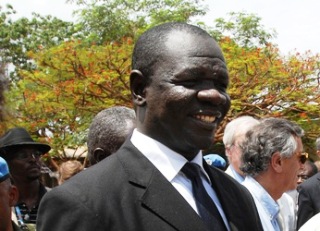South Sudan will pay for all loses from Wau transfer conflict – draft report
January 9, 2013 (WAU) – Western Bahr el Ghazal is to ask South Sudan’s central government to financially compensate businesses whose properties were damaged by protests in December over administrative changes that were rejected by many ethnic groups, according to a draft report seen by Sudan Tribune.

A draft of the report, by assessment and compensatory committee appointed by Governor Rizik Zachariah Hassan, seen by Sudan Tribune, recommends South Sudan’s central government take “full responsibility” for compensating all losses incurred by national and foreign businesses.
The Mayor of Wau town Michael Ukel and his deputy have been to assess severity of the losses incurred by business groups and damages caused to government and individual properties as a result of protest and to present estimated cost of compensation.
The position of Wau town Mayor was established in October as part of the move to transfer the headquarters of Wau and Jur River counties out of the state capital. The government argues that the move is necessary to provide better services to people in rural areas but some ethnic groups have seen the proposal as an attempt to marginalise their communities.
In Bagari district, the area which is due to host the new administrative centre of Wau County, 26 civilians were killed in December. The apparent ethnic dimension to the protests and killings in Bagari has shocked South Sudanese politicians including the President Salva Kiir, who visited Wau on 24 December to appeal for calm and to support the Governor’s decision.
Some community leaders and politicians have been questioned over the incidents. The communities affected have now backed the proposal Governor Hassan said earlier this week.
In his draft recommendations Michael Ukel suggests: “Given the nature and complexity of the incident and capacity of the state government to handle this situation, the committee recommends that the central government takes full responsibility for all damages and losses incurred by both national and foreign businesses as a result of protest.
The report which carries Ukel’s signature estimates that the protests have caused four billion South Sudan pounds (SSP) worth of damage – around one million US dollars.
Ukel describes the damage as “a great lose” to the nation, which is already battling with the austerity measures as a result of a budget deficit brought about by the closure of oil production a year ago.
South Sudan stopped pumping its oil through neighbouring Sudan, accusing the Khartoum government of stealing oil worth 815 million dollars. Sudan claimed that it was taking southern crude as it passed through its territory in lieu of unpaid fees – an allegation Juba denies.
In September the two sides signed a deal agreeing a new transit fees but the failure to implement border security arrangements has meant that production has still not resumed much the detriment of both economies.
The state government had previously said that 53 commercial trucks were set on fire by the protesters but Ukel’s report seems to put the number at just nine. “The compensation should cover only nine trucks burned during the violence”, the report reads in part.
The report seems to confirm the commitment Governor Hassan gave at news conference held in Juba on 7 January, during which he announced compensation for all damages and losses as a result of protest.
“There will be compensation for the nine trucks which were burnt and the four that were looted. This is a crime which will not be accounted for by the state but by the Republic of South Sudan because a foreigner does not know that there is a political problem of relocating to Bagari but knows that his goods were looted by South Sudanese”, Hassan told journalists.
Special attention appears to have been given to foreign businesses because of the pressure they have exerted on the government through their governments.
There has been no indication yet that the families of those killed in the protests will be compensated by the government. The government has denied that the police or army were responsible for the deaths of the protestors in Wau despite a video emerging showing armed man in Wau town shooting a apparently unarmed protestors on 9 December.
Western Bahr el Ghazal’s Minister of Information says that the security investigation committee has not yet completed their findings into the exact number of people killed and wounded.
Compiling reports from government and medical sources it appears that around 20 protestors died in December, although the former Commissioner of Wau County, John Peter Miskin, who resigned over the proposed transfer claims the real death toll is higher.
A full announcement is expected to be made by the end of the month.
(ST)
